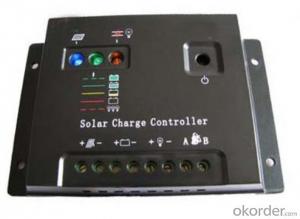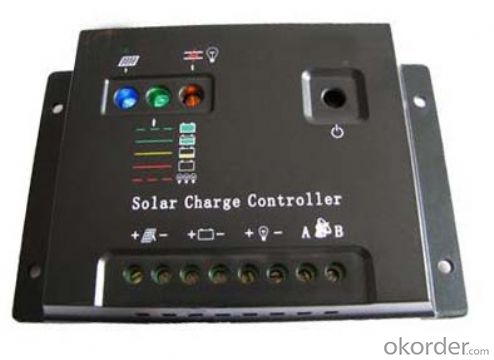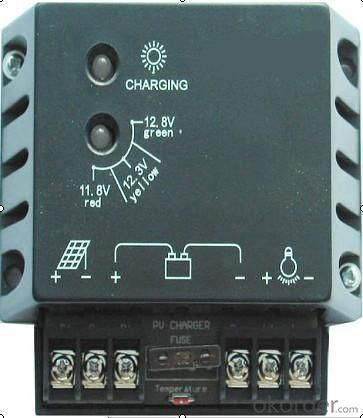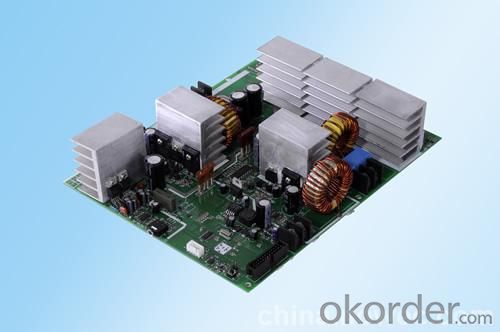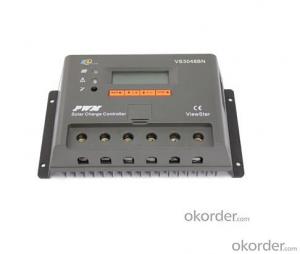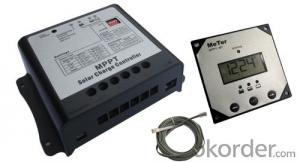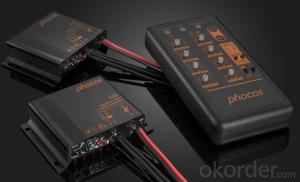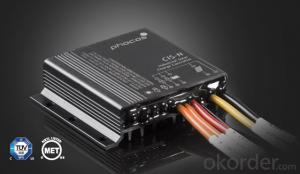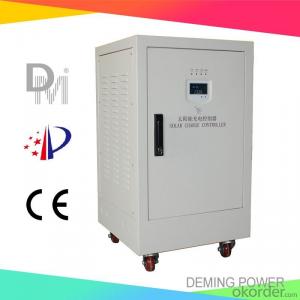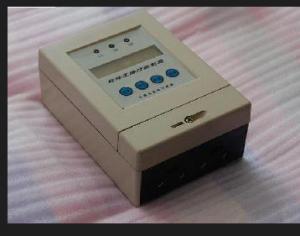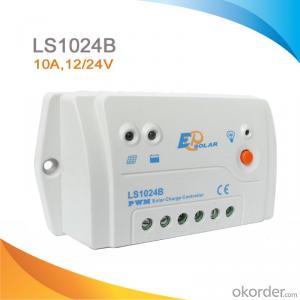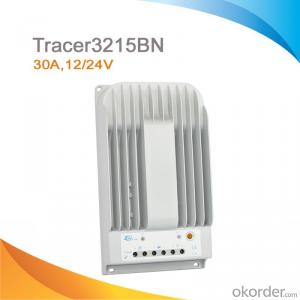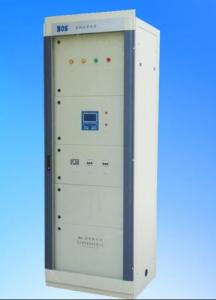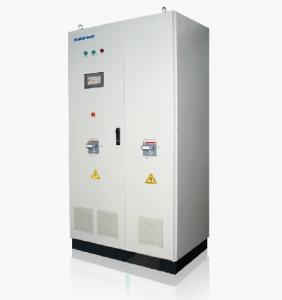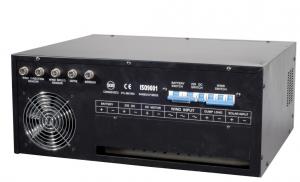Pool Solar Panel Controllers - Solar Charge Controller
- Loading Port:
- China Main Port
- Payment Terms:
- TT OR LC
- Min Order Qty:
- -
- Supply Capability:
- -
OKorder Service Pledge
Quality Product, Order Online Tracking, Timely Delivery
OKorder Financial Service
Credit Rating, Credit Services, Credit Purchasing
You Might Also Like
Specifications
CE certified.suitable for home use and solar street light use, time control and light control with temperature sensor.
Solar Controller
1.Multi protections, Factory price
2.Self-consumption:6mA, Big terminals:4mm2
3.2 years guarantee
4.CE,RoHS
solar one charge controller, top two in China. CE certified, stable performance, stable production capacity. Most popular goods for exporting. Especailly widely used in Solar system from 50W to 5kw.
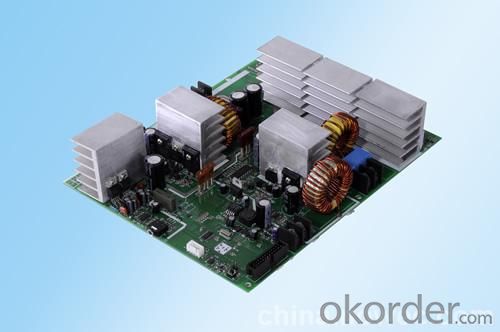
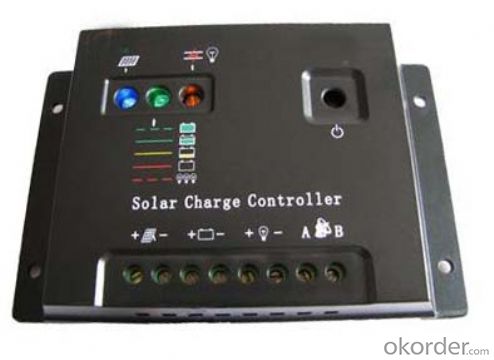
- Q: What is the role of a solar controller in preventing battery freezing?
- The role of a solar controller in preventing battery freezing is to regulate the charging and discharging of the battery based on its temperature. It monitors the battery temperature and adjusts the charging voltage accordingly to prevent overcharging in cold temperatures, which can lead to freezing. By ensuring that the battery is charged at the correct voltage, the solar controller helps maintain the battery's temperature within a safe range, preventing freezing and potential damage to the battery.
- Q: Can a solar controller be used with a portable solar panel setup?
- Yes, a solar controller can be used with a portable solar panel setup. A solar controller helps regulate the charging process, prevents overcharging, and optimizes the energy output from the solar panels. Whether it's a portable or fixed solar panel system, a solar controller is essential for efficient and safe operation.
- Q: Can a solar controller be used with a solar-powered outdoor advertising system?
- Indeed, a solar-powered outdoor advertising system can make use of a solar controller. In fact, the utilization of a solar controller is vital for a solar power system as it effectively manages the transfer of electricity from the solar panels to the advertising system. This essential component optimizes the charging procedure, prevents excessive charging or discharging of the batteries, and safeguards the system against potential harm due to voltage fluctuations. By incorporating a solar controller, the solar-powered outdoor advertising system can fully exploit and leverage the energy generated by the solar panels, guaranteeing consistent and effective functionality.
- Q: What is the maximum number of user-defined settings supported by a solar controller?
- The maximum number of user-defined settings supported by a solar controller can vary depending on the specific model and brand. However, in general, solar controllers typically support multiple user-defined settings, ranging anywhere from a few to several dozen.
- Q: What is the compatibility of a solar controller with other components?
- The compatibility of a solar controller with other components refers to its ability to effectively work together with other devices in a solar power system. This includes compatibility with solar panels, batteries, inverters, and other equipment. It is essential for a solar controller to be compatible with these components to ensure optimal performance, efficient energy conversion, and reliable operation of the entire system.
- Q: How do you determine the right size of solar controller for a system?
- To determine the right size of a solar controller for a system, you need to consider the maximum current and voltage of your solar panels. The solar controller should be able to handle the maximum current produced by the panels and the maximum voltage they generate. Additionally, you should also consider the number of panels and the total wattage of your system to ensure the solar controller can effectively handle the overall power output.
- Q: Can a solar controller be used with a solar-powered residential building?
- Yes, a solar controller can be used with a solar-powered residential building. A solar controller is an essential component in a solar power system as it regulates the charging and discharging of batteries, manages power flow, and optimizes the performance of the solar panels. It ensures that the solar energy generated is efficiently stored and utilized, making it suitable for use in residential buildings powered by solar energy.
- Q: How do you troubleshoot common issues with solar controllers?
- When troubleshooting common issues with solar controllers, there are a few steps you can follow to identify and resolve the problem: 1. Check the connections: Ensure all the connections between the solar panels, battery, and load are secure and properly connected. Loose or faulty connections can lead to issues with the controller's functionality. 2. Examine the display: If your solar controller has a display, check for any error codes or abnormal readings. This can provide valuable information about the issue. Refer to the user manual or manufacturer's documentation to understand the meaning of the error codes. 3. Inspect the wiring: Look for any signs of damage or wear on the wiring. Rodents or extreme weather conditions can cause wire damage, which can lead to malfunctions in the system. Repair or replace any damaged wires to ensure proper functioning. 4. Test the voltage: Use a multimeter to measure the voltage of the battery and solar panels. Compare the readings to the expected values specified by the manufacturer. If there is a significant difference, it could indicate a problem with the controller or the solar panel itself. 5. Reset the controller: Many solar controllers have a reset button or a procedure to reset the device to its factory settings. Try resetting the controller to see if it resolves the issue. Make sure to save any custom settings before performing a reset. 6. Check the battery health: If the solar controller is not charging the battery properly, it could be due to a faulty battery. Test the battery separately to verify its health and capacity. If necessary, replace the battery with a new one. 7. Inspect the solar panels: Examine the solar panels for any damage or obstructions that may prevent them from receiving sufficient sunlight. Dirt, debris, or shading can reduce the efficiency of the panels, leading to poor charging performance. 8. Consult the manufacturer or an expert: If you have exhausted all troubleshooting steps and are still experiencing issues, it is recommended to reach out to the solar controller manufacturer's customer support or consult a professional for further assistance. They can provide specific troubleshooting guidance or arrange for repairs or replacements if necessary. Remember to prioritize safety when troubleshooting solar controllers by following proper electrical handling procedures and disconnecting power sources before conducting any inspections or repairs.
- Q: Can a solar controller be used with a solar-powered outdoor entertainment system?
- Yes, a solar controller can be used with a solar-powered outdoor entertainment system. A solar controller regulates and optimizes the charging process of the solar panels, ensuring that the energy generated is efficiently stored in the batteries of the system. This helps to prevent overcharging and extend the lifespan of the batteries. Therefore, using a solar controller is highly recommended for any solar-powered outdoor entertainment system to enhance its performance and reliability.
- Q: How does a solar controller handle battery under-voltage protection?
- A solar controller handles battery under-voltage protection by monitoring the voltage of the battery connected to the solar system. If the battery voltage drops below a preset threshold, the solar controller will automatically disconnect the battery from the charging source, preventing further discharge and potential damage to the battery. This feature ensures the longevity and health of the battery while optimizing its performance.
Send your message to us
Pool Solar Panel Controllers - Solar Charge Controller
- Loading Port:
- China Main Port
- Payment Terms:
- TT OR LC
- Min Order Qty:
- -
- Supply Capability:
- -
OKorder Service Pledge
Quality Product, Order Online Tracking, Timely Delivery
OKorder Financial Service
Credit Rating, Credit Services, Credit Purchasing
Similar products
Hot products
Hot Searches
Related keywords
